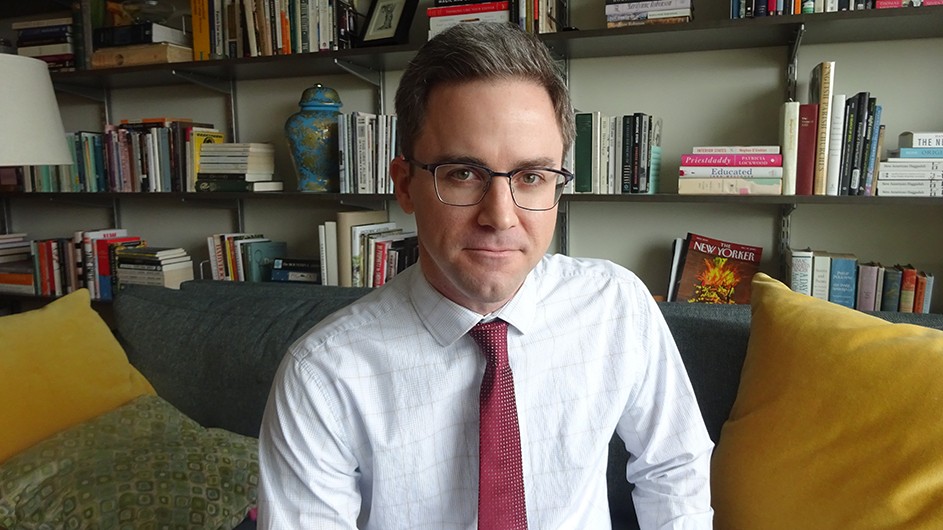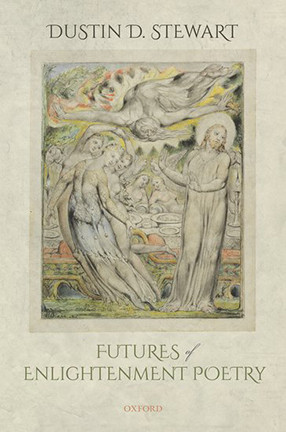The Power of Poetry
Professor Dustin D. Stewart provides an updated look at the history of English poetry in his first book.

In his new book, Futures of Enlightenment Poetry, Professor Dustin D. Stewart, who teaches in the Department of English and Comparative Literature, offers a revisionist look at the history of English poetry, specifically the meditative long poem, from Milton to early Romanticism. Included are new interpretations of major and minor poems, placing them in fresh historical, theoretical, and theological contexts.
Stewart talks about the book with Columbia News, along with his belief in the power of poetry—especially the solace it can provide during the pandemic—which poets he turns to, and who he would invite to a dinner party.
Q. Why did you write this book?
A. My area of concentration is the 18th century, and several generations of scholars who came before me were encouraged to think of that period as a secular age, the Enlightenment with a capital “E,” whose most important literary product was the modern novel. I started my research for the book by reading historians and literary critics who helped me move partly away from both of those baseline assumptions. They pointed me to a messy yet lively religious marketplace in 18th-century England, and I began to wonder how that scene inclined readers of literature to think about poetry.
I found myself drawn in particular to discarded classics, poets who in their moment were hailed as culture-defining voices, but who in hindsight came to seem like minor figures or bit players. I wanted to know what might happen to the history of poetry when we put such half-remembered books and sidelined authors at the center of the action. In pushing to finish the book, though, I found myself thinking less about what I could make of these writers, and more about what they would make of me.
Q. How did you develop a revisionist history of English poetry, from Milton to early Romanticism?
A. I’m fascinated by the process by which a writer can build on the work of a beloved predecessor—drawing energy and inspiration from it—while at the same time rejecting some fundamental part of the earlier author’s outlook. My first “aha!” moment came in the recognition that some mid-18th-century poets who saw themselves as following in the literary footsteps of John Milton (1608–1674) also succeeded in bending his legacy in strikingly different philosophical and theological directions. They kept the body of his poetry, you might say, but reinvented its soul.
Much later in my writing process, I recognized that these same 18th-century writers were, in their turn, reinvented by Romantic poets who followed them, Romantics who relied on the 18th-century figures as sources, but also played down some ideas they had played up. At that point, I could see the outlines of a story that wasn’t like the standard literary histories I had been taught.

Q. Why do you advocate for the reading and writing of poetry as a spiritual practice, and a way of experiencing the future here and now?
A. I wouldn’t say that I want to read poetry this way, but the authors who are central to the book certainly hope I’ll give it a try. One of those poets is Edward Young (1683–1765). When Young looked at the Enlightenment intellectual landscape around him, he found that neither the cultural authority of poetry nor religious faith in the soul could be taken for granted any longer. He decided that the fate of the one depended on the fate of the other.
His most emphatic claim is that when you read a poem (at least the right kind of poem), you can feel the kind of future state you’ll experience after your body dies. You can pull that future to the present, practicing for the afterlife in the here and now by experimenting with verse. This sounds bizarre, I know, but another one of my recurring themes is that it’s a defense of poetry that’s still with us today.
Q. Are there certain poets you return to again and again?
A. On the bookshelf near my favorite spot in my apartment, where I’m sitting right now, a few living poets are within reach: Louise Glück, Linda Gregerson, Roger Reeves, Danez Smith, Tracy K. Smith, Christian Wiman. Near them are Coleridge, Dickinson, Donne, Milton, Pope.
Q. Which poets have you found particularly helpful and/or comforting during the pandemic?
A. I’ve found wisdom in Storm Toward Morning by Malachi Black, a poet I got to know when we were both in graduate school in Austin. (Until recently, I had forgotten that back in 2012 Malachi published a chapbook titled Quarantine.) I’ve been noticing that the poems of postwar writers Philip Larkin and Donald Davie resonate differently, in a jarring but good way, in the cramped domestic space of a pandemic winter.
These days, I only can only do non-work-related reading in fits and bleary-eyed starts, and I need those snatches of time to reassure me that slow, sustained attention will be possible again at some point. Yet reassurance isn’t the only thing we need right now. For that reason, I think every reader of poetry ought to be working through The Age of Phillis by Honorée Fanonne Jeffers.
Q. What's on your reading list?
A. Recently published prose waiting on my Kindle or sitting on my bookshelves, unread and judging me for getting too far behind, includes Alexander Chee’s How to Write an Autobiographical Novel, Kristin Kobes Du Mez’s Jesus and John Wayne, Jessica Goudeau’s After the Last Border, Daisy Johnson’s Sisters, Catherine Lacey’s Pew, James McBride’s Deacon King Kong, Helen MacDonald’s Vesper Flights, Anne Helen Petersen’s Can’t Even, and Brandon Taylor’s Real Life.
Q. What's your favorite book that no one else has heard of?
A. I’d say Elizabeth Singer Rowe’s Friendship in Death (1728), but fellow scholars of the 18th century have heard of that one even if they don’t, in general, share my affection for it. A more recent alternative is Daniel Hornsby’s Via Negativa, a novel published in 2020 that didn’t get the fanfare I think it deserved. What connects the two is my interest in religious novels that probably shouldn’t work, but somehow do.
Q. What are you teaching this term? How are you helping your students cope with online learning?
A. This spring I’m teaching the second half of a yearlong course called Literature Humanities, part of the Core Curriculum, as well as a class on the early history of the novel in English. I’ve organized the novel class around Laurence Sterne’s Tristram Shandy, one of my favorites from the period I study. In his dedication, Sterne explains that he has been writing it in “a retired thatch’d house, where I live in a constant endeavour to fence against the infirmities of ill health, and other evils of life, by mirth.” Isolated and threatened by looming sickness, Sterne figured that the best he could do was to give his readers some laughs—bookish laughs, no doubt, but laughs nonetheless. I find this stance appealing.
Amid the challenges of online learning, I’m working hard to teach my students new ideas and new skills, new perspectives on the cultural past that might make a real difference in our shared future. But I’m also hoping we might learn from Sterne how to avoid the mistake of taking ourselves and our perspectives too seriously.
Q. You're hosting a dinner party. Which three academics or scholars, dead or alive, would you invite and why?
A. I’d love to hear the living Montclair State University Professor Patricia Matthew and the late writer and academic Raymond Williams discuss what a university is for. It might be worthwhile to add a perspective that precedes the development of the modern European research university; could a third guest be Peter Abelard? Petrarch? Or, from the 18th century, Columbia founder Samuel Johnson? If they’re all busy, the other Samuel Johnson would be better company anyway.
Check out Books to learn more about publications by Columbia professors.